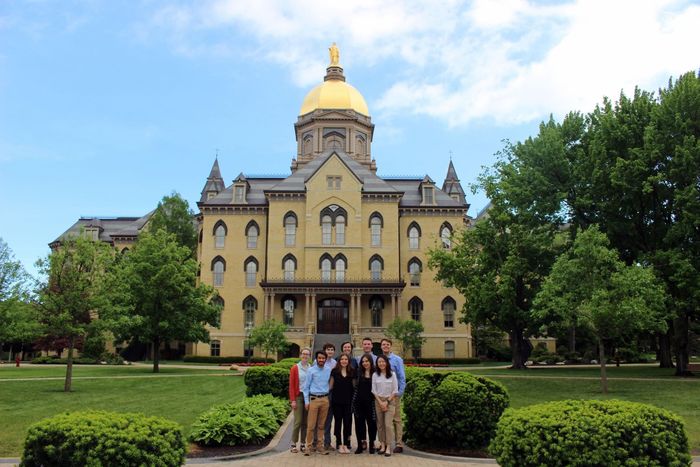
Economics students at the University of Notre Dame are contributing to the evidence-based anti-poverty research conducted by Notre Dame economics professors and research faculty at the Wilson Sheehan Lab for Economic Opportunities (LEO). Through LEO’s internship program, students gain real-life experience in areas such as project management, data collection, statistical and econometric analysis, and research report writing.
LEO’s mission is to reduce poverty and improve lives through evidence-based programs and policies, and student interns actively contribute to achieving this vision. They provide critical support to some of the most important aspects of LEO’s work to alleviate poverty and expand the lab’s capacity to take on a growing number of research projects.
In addition to the value these students bring to LEO, they also gain experience with top-tier impact evaluations and data and benefit from mentoring by LEO research faculty. This helps them apply the analytical techniques they learn in the classroom to real-world experiences, honing their skills in preparation for entering competitive graduate programs and the job market.
“We are fortunate that such bright, committed, compassionate students choose to work at LEO,” says Professor James Sullivan, LEO co-founder and director. “They will be the next generation of leaders using evidence to solve some of our country’s most pressing problems.”
Research interns are assigned to one or more specific LEO projects and aide in aspects of the work ranging from running data through a Stata code to communicating with partner agencies, the nonprofit and government entities that operate the anti-poverty programs LEO studies. Other interns help usher new project partners through the exploratory research design phase, support the administrative functions that undergird LEO’s work, and promote dissemination of LEO’s research findings to service providers, funders, and policy makers.
LEO’s interns for the 2019-2020 academic year are:
- Alina Song - University of Notre Dame ‘21, Economics – Research assistant, Rapid Re-housing and Coaching for At-Risk High School Youth projects
- Charlie Hanzel - University of Notre Dame ‘21, Economics – LEO project development
- Chloe Jacobs - Saint Mary’s College ’20, Economics – LEO marketing and communications
- Emily Merola - University of Notre Dame ‘20, Economics – Research assistant, Jail Mental Health Screening and Outreach project
- Godsee Joy - University of Notre Dame ‘20, Economics – LEO project development
- Grace Palmer - University of Notre Dame ‘21, Political Science – LEO marketing and communications
- Katherine Fugate - University of Notre Dame ’20, Economics – Research assistant, Income-Based Fares Transit Subsidy and Court Appearance Transit Subsidy projects
- Maria Amenabar Farias - University of Notre Dame ‘20, Economics – LEO administrative operations
- Sean McConville - University of Notre Dame ‘21, Economics – Research assistant, Padua project
- Victor Cardeno - University of Notre Dame ‘20, Economics – Research assistant, Bridges to Success and Youth and Family Homelessness Prevention projects
 Victor Cardeno
Victor Cardeno
"Adding value to the noble and worthwhile pursuit of homelessness prevention fulfilled my professional desire to be proud of going into work every single day," senior economics student Victor Cardeno says. "I knew that LEO could give me a glimpse into the daily life of that profession and everything that it means to work on projects like these as a career."
During the school year, students work directly with LEO faculty and staff on Notre Dame's campus. Summer interns may spend several weeks in the field, working on-site with project partners across the country.
 Katherine Fugate
Katherine Fugate
Katherine Fugate, also a senior studying economics, spent the past summer in the field working directly with LEO partner King County Metro in Seattle, WA on two transit fare subsidy studies. She says this elevated the value of her experience working at LEO.
"I felt like I was able to provide an interesting insight to the LEO team about what I was seeing day-to-day in my court observations or by learning more about the low-income rider program that Metro runs," says Fugate. "It was also great to be in conversation directly with Metro and hear what their team's specific interests in the projects were, what results they were hoping to see at that end, and how they would use that data to inform policy."
While learning more about how these programs work, Fugate says she developed valuable technical skills and gained experience working with anti-poverty program design and implementation. "Whether I end up in the public sector, with an advocacy group, or in program evaluation," she says, "I know the research skills I've gained with LEO will be a huge benefit to me in the future."
Want to learn more about an internship with LEO? Please email leo@nd.edu for more information.